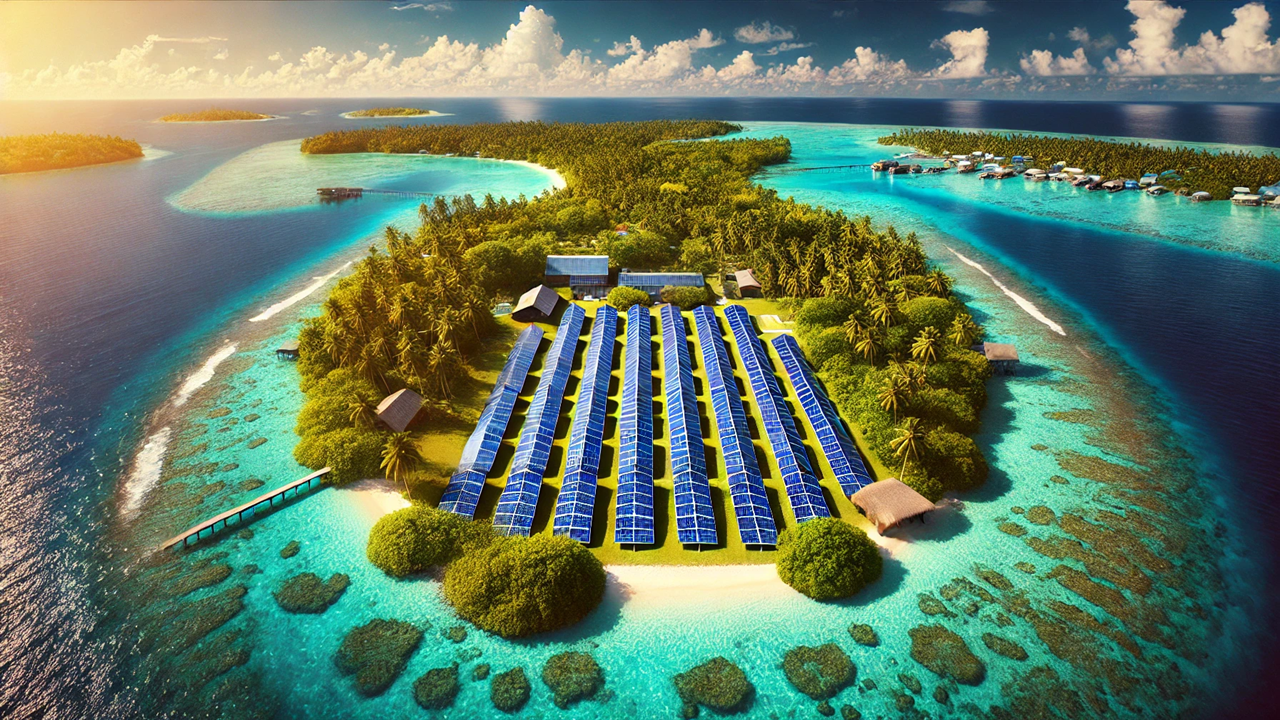Maldives’ Green Leap: Transforming Outer Islands with Hybrid Renewable Energy
The Maldives is transforming its outer islands' energy infrastructure through the "Preparing Outer Islands for Sustainable Energy Development" (POISED) project, which integrates hybrid renewable energy systems. This initiative, supported by the Asian Development Bank, reduces the nation's dependency on imported diesel, cuts greenhouse gas emissions, and promotes economic and social benefits, including job creation and improved health outcomes.

In the heart of the Indian Ocean, the Maldives, known for its stunning coral islands and luxury resorts, is taking bold steps towards energy independence and environmental sustainability. This island nation, heavily reliant on imported fossil fuels, has embarked on an ambitious project that could serve as a model for other small island states. The "Preparing Outer Islands for Sustainable Energy Development" (POISED) project is a groundbreaking initiative that aims to transform the energy landscape of the Maldives by deploying advanced hybrid renewable energy systems across its outer islands.
Shifting Away from Diesel Dependency
For years, the Maldives has faced significant challenges due to its dependency on imported diesel for electricity generation. This reliance has made electricity costly and left the nation vulnerable to fluctuations in global oil prices. Moreover, the environmental impact of diesel-based power generation has been a growing concern, with greenhouse gas (GHG) emissions contributing to global climate change and local pollution issues.
Recognizing these challenges, the Maldivian government, with support from the Asian Development Bank (ADB) and other international partners, launched the POISED project in 2015. The project’s primary goal is to reduce the country's dependence on fossil fuels by introducing hybrid renewable energy systems in 160 inhabited outer islands. These systems combine solar photovoltaic (PV) panels, batteries, modern diesel generators, and advanced energy management systems to create a more sustainable and resilient power grid.
The POISED Project: A Model for Sustainability
The POISED project is being implemented in multiple phases, with significant milestones already achieved. In the first phase, hybrid solar PV and diesel systems were installed on five pilot islands, setting the stage for broader implementation. The success of these pilot projects demonstrated the feasibility of integrating renewable energy into the existing grid and provided valuable insights for scaling up the initiative.
One of the most notable achievements of the POISED project is the installation of a technologically advanced hybrid power system in Addu City, the Maldives’ second most populous city. This system includes a 1.6 MW solar PV array, a cutting-edge battery energy storage system (BESS), and a sophisticated energy management system (EMS). These components work together to stabilize the grid, reduce diesel consumption, and ensure a reliable supply of electricity even in the face of fluctuating solar power generation.
The benefits of this hybrid system are already evident. The advanced BESS and EMS allow the power grid in Addu City to maintain stability despite variations in solar energy availability, thereby reducing the need for diesel generators to operate inefficiently at low loads. As a result, the system has achieved a 12.5% reduction in diesel fuel consumption, surpassing initial expectations.
Environmental, Social, and Economic Impact
The environmental benefits of the POISED project are significant. By reducing the reliance on diesel generators, the project has substantially cut down GHG emissions, contributing to the Maldives’ commitment to combat climate change. The reduction in diesel use also minimizes the risk of fuel spills and water contamination, protecting the country’s fragile freshwater resources.
Socially, the project has had a positive impact on local communities. The transition to cleaner energy sources has led to improved air quality, reducing health risks associated with diesel exhaust. Additionally, the project has created employment opportunities in the installation, maintenance, and operation of the hybrid systems, with a particular emphasis on gender equity. Women have been actively involved in the project’s implementation, from training to technical roles, ensuring that the benefits of sustainable energy reach all segments of society.
Economically, the POISED project is helping to lower the cost of electricity in the Maldives, which has historically been among the highest in South Asia. As more islands transition to hybrid systems, the savings on fuel imports and the reduced need for government subsidies on electricity are expected to ease the financial burden on the nation. Furthermore, the move towards renewable energy is enhancing the Maldives’ appeal as a green tourism destination, potentially boosting its economy by attracting environmentally conscious travelers.
A Vision for the Future
The success of the POISED project has reinforced the Maldives' commitment to sustainable energy and climate resilience. The project aligns with the country’s broader policy goals, including its nationally determined contributions (NDCs) under the Paris Agreement and the United Nations’ Sustainable Development Goals (SDGs). The government plans to build on this momentum by exploring further renewable energy projects and continuing its collaboration with international partners like the ADB.
As the Maldives continues its journey towards energy independence, the POISED project serves as a beacon of what is possible when innovation meets commitment. This small island nation is not only addressing its energy challenges but also setting an example for other small island developing states to follow.
- FIRST PUBLISHED IN:
- Devdiscourse










